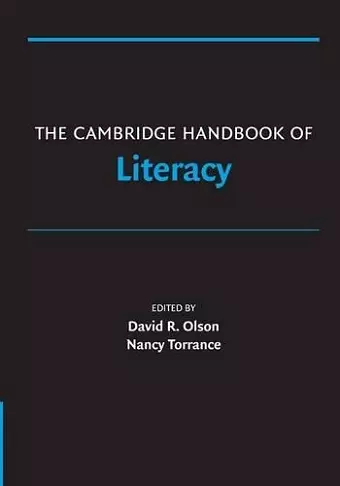The Cambridge Handbook of Literacy
David R Olson editor Nancy Torrance editor
Format:Paperback
Publisher:Cambridge University Press
Published:9th Feb '09
Currently unavailable, and unfortunately no date known when it will be back
This paperback is available in another edition too:
- Hardback£140.00(9780521862202)

Everything that is involved in being and becoming literate is the concern of this interdisciplinary group of distinguished scholars.
This handbook marks the transformation of the topic of literacy from the narrower concerns with learning to read and write to an interdisciplinary enquiry into the various roles of writing and reading in the full range of social and psychological functions in both modern and developing societies.This handbook marks the transformation of the topic of literacy from the narrower concerns with learning to read and write to an interdisciplinary enquiry into the various roles of writing and reading in the full range of social and psychological functions in both modern and developing societies. It does so by exploring the nature and development of writing systems, the relations between speech and writing, the history of the social uses of writing, the evolution of conventions of reading, the social and developmental dimensions of acquiring literate competencies, and, more generally, the conceptual and cognitive dimensions of literacy as a set of social practices. Contributors to the volume are leading scholars drawn from such disciplines as linguistics, literature, history, anthropology, psychology, the neurosciences, cultural psychology, and education.
“The Cambridge Handbook of Literacy offers a broad descriptive perspective not driven by an immediate educational agenda. When schooling’s relation to literacy is approached within this cross-cultural, non-curricular frame, we come to see the dilemmas and processes of schooling in new ways. The fresh approach of this volume introduces many topics not covered in other reference volumes and expands our view of the multidimensional complexity of literacy. Many chapters also develop a fully participatory view of literacy that puts writing on an even and interactive footing with reading. The international, interdisciplinary authors cover wide-ranging topics from the cognitive skills necessary to read Chinese mathematics to the tensions between classical and vernacular Arabic, from neuroscience to cultural authority, from grammatology to international development. This volume is a welcome addition to our growing knowledge of reading, writing, and texts within human life.” —Charles Bazerman, University of California, Santa Barbara
“A new compendium on a venerable topic, with unprecedented comprehensiveness and depth. This is an essential reference for scholars interested in the origins, impact, and dissemination of literacy, in its widest definition.” —Merlin Donald, Professor Emeritus, Queen’s University
“David Olson and Nancy Torrance are acknowledged authorities in literacy studies and this volume brings together their skills as both thinkers and editors. The essays provide a comprehensive introduction to the historical, anthropological, and psychological dimensions of literacy.” —Brian Stock, Emeritus Professor of History and Literature, University of Toronto
"The Cambridge Handbook of Literacy stands alone as an interdisciplinary inquiry and an informed addition to the study of literacy. The handbook will probably be embraced by a diverse audience in addition to the community of researchers in the disciplines represented. I recommend that this significant contribution to the existing resources on the nature and study of literacy be used by university professors of literacy as a text for graduate courses in language and literacy. Undergraduates pursuing advanced studies in literacy should also read it. Parts of it could be used in professional learning communities for teacher researchers who are keen and enthusiastic about the study of literacy and wish to challenge their thinking and enliven their dialogue about the nature and changing role of literacy. Beyond this, several chapters of the handbook may benefit senior government officials responsible for developing international literacy standards and policies. After reading The Cambridge Handbook of Literacy, one cannot help but ask the question, How can literacy not be important to everyone?" —Vera Janjic-Watrich, University of Alberta
"The Cambridge Handbook of Literacy, edited by David Olson and Nancy Torrance from University of Toronto, joins a hefty list of Cambridge Handbooks on various topics related to psychology, language and learning. This handbook sets out to examine literacy in its widest sense; to examine both the visual signs for linguistic forms, and the social and personal uses of these signs, from mundane to the literary, both historically and currently. It aims to address a gap that it identifies in the literature: the lack of an authoritative text on literacy as a field in itself, and in providing such a text, further aims to provide scope for future interdisciplinary work...." --Rauno Parrila, University of Alberta and Nenagh Kemp, University of Tasmania, Australia, Canadian Psychology/Psychologie Canadienne
ISBN: 9780521680523
Dimensions: 251mm x 175mm x 28mm
Weight: 1070g
624 pages